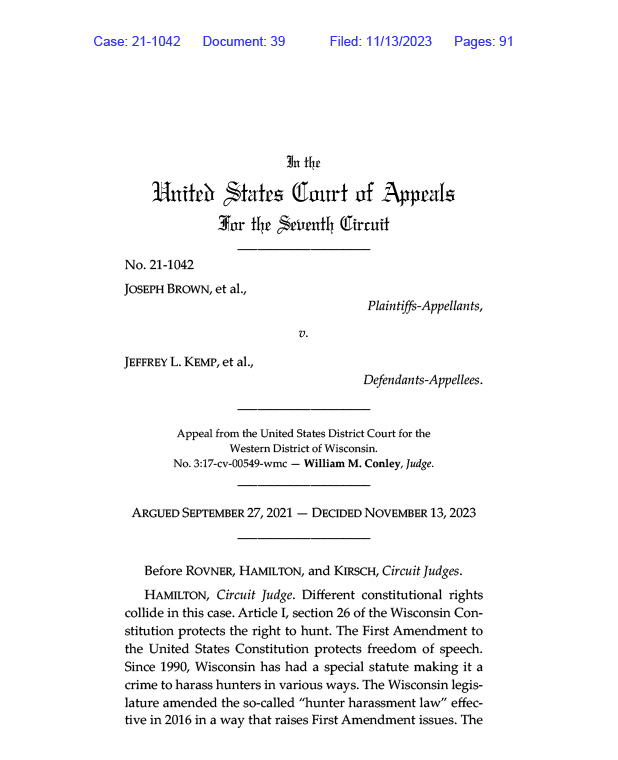
Provisions of Wisconsin’s So-called Hunter Harassment Law Ruled Unconstitutional
Seventh Circuit Court of Appeals reverses lower court’s decision, ruling that the challenged provisions violate the First Amendment
Contacts: media@aldf.org
MADISON, Wis. — The Animal Legal Defense Fund celebrates the Seventh Circuit Court of Appeal’s opinion holding provisions of a Wisconsin hunter protection law unconstitutional, overturning a U.S. District Court for the Western District of Wisconsin dismissal in December 2020 for lack of standing by the plaintiffs. The Seventh Circuit’s 91-page decision not only reverses the standing issue, but details the numerous ways the law violates the First Amendment.
The law, referred to as a ‘hunter harassment law’ by hunting proponents, criminalizes photographing or videotaping hunting activities, as well as approaching or even “maintaining a visual or physical proximity” to a hunter on public lands — but only if done with the intent to interfere with the hunt.

The opinion held that the challenged provisions are unconstitutionally vague because “they fail to provide reasonable notice as to what conduct is criminal, and they fail to provide reasonable constraints on the discretion of enforcement officials. They thus tend to create significant chilling effects on constitutionally protected activity, as they have for these plaintiffs.” The opinion also notes, “the statute explicitly discriminates based on the motives of those documenting and monitoring hunting activity.”
“The appeals court agrees the Wisconsin hunting statute violates the First Amendment rights of those trying to dispense accurate and critical information about how hunters are killing wildlife outside of the public’s view,” says Animal Legal Defense Fund Managing Attorney Christopher Berry. “Monitoring hunting activity provides vital information to the public, including evidence of trespassing on closed trails, use of illegal baits and traps, and even illegal over-hunting of gray wolves.”
The lawsuit claimed the law’s restrictions violate the First Amendment by criminalizing the monitoring and documenting activities of journalists and activists who film and expose to public view unethical and harmful hunting practices — operating in the same way Ag-Gag statutes do with respect to investigations and whistleblowing in factory farms and slaughterhouses. Further the Animal Legal Defense Fund argued the statute’s purpose and effect is to suppress criticism of hunting while favoring pro-hunting views. In addition to criminal penalties, the law subjects violators to civil lawsuits brought by the hunters and trappers themselves.
The three plaintiffs in the lawsuit, represented by attorneys from the Animal Legal Defense Fund and a pro bono law firm, are Wisconsin residents who, as a documentarian, journalist and activist, conduct and rely on the monitoring activities the amended statute now prohibits. The plaintiffs say hunters in the state have already been emboldened by the amended statute, leading to more frequent and aggressive confrontations.
Related
-
Opposing the Cultivation and Trade of Octopus Produced through Unethical Strategies Act Introduced in the U.S. Senate
The federal bill would prevent the industry from gaining traction by banning commercial octopus farming in the U.S.July 25, 2024 News -
Complaint Demands Endangered Species Act be Enforced Against Washington Sham Animal Sanctuary to Protect Animals
Predators of the Heart, sometimes also known as Because We Matter Exotic Animal Rescue, has threatened to kill endangered wolves if it is not allowed to reopen.July 16, 2024 Press Release -
Lawsuit Filed Against USDA for Issuing Animal Welfare Act License to Serial Violator Yellowstone Bear World
The complaint argues the wildlife park causes undue stress to bear cubs by offering bottle-feeding and photo opportunities to the public as well as separating them from their mothers.July 16, 2024 Press Release



